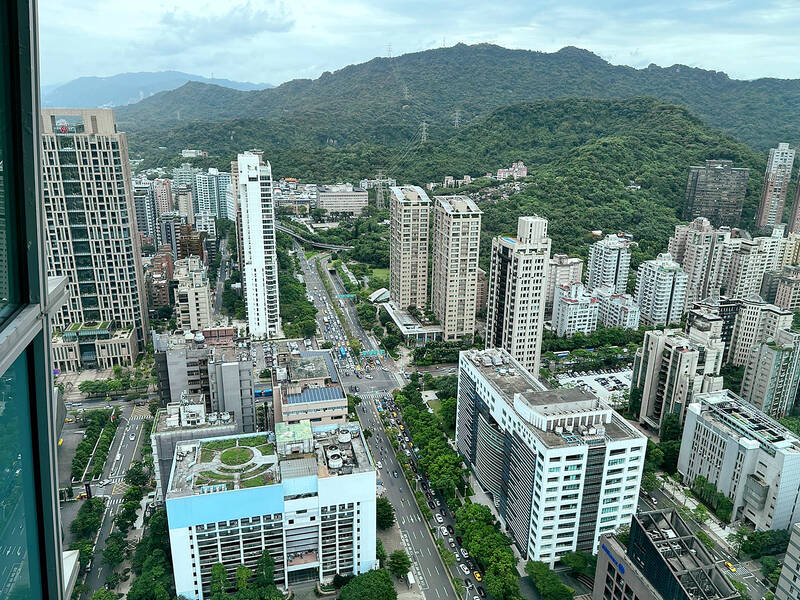A majority of prospective home buyers would cut their budget or postpone their purchase if the central bank raises interest rates again tomorrow, a survey by Sinyi Realty Inc (信義房屋) showed yesterday.
Taiwan’s only listed real-estate broker arrived at the prediction after conducting an online survey between Thursday last week and yesterday.
Interest rates for home purchases would climb to 1.86 percent for new mortgages, the highest since 2016, if the central bank raises its policy rate by another 0.125 percentage points as expected, Sinyi research manager Tseng Ching-der (曾進德) said.

Photo: Hsu Yi-ping, Taipei Times
The move would mean an extra financial burden for home owners and nearly 40 percent of prospective owners would cut their budget for home purchases to avoid overly leveraging, the analyst said, adding that people have generally felt the pinch this year because of rising prices of consumer goods.
Another 16 percent said they would put off purchasing a home on concern over further monetary tightening, it said.
Only 41 percent of respondents indicated that they would go ahead with their plans to purchase a home regardless of interest rates.
The remaining 4 percent did not express a view.
The central bank would make known its monetary policy intentions after a quarterly board meeting tomorrow afternoon.
Taiwanese have grown used to low interest rates and have turned cautious following two previous rate hikes that raised borrowing costs by 37.5 basis points so far this year, Tseng said.
Sinyi suggested potential home buyers assume interest rates of 2 percent on their mortgages and cut their dependence on grace periods when calculating their finances.
Separately, more than 80 percent of institutional investors backed commercial property as a positive investment tool with stable income, although they were divided about the nation’s economic outlook, a survey by Colliers International Taiwan (高力國際) found yesterday.
While 43 percent of respondents were negative about the nation’s economy in the next 12 months, 35 percent held a bullish view, the property consultancy said.
More than 80 percent of developers, life insurers, investment institutes and asset management companies remained upbeat that commercial properties would generate stable income and they would keep looking for investment targets, it said.
Logistics and warehousing facilities were most sought-after, followed by industrial complexes, plots of land and office space, the survey showed.
COVID-19 outbreaks, global supply chain realignment and capital repatriation have led to Taiwanese companies returning home and lent support to the formation of new technology clusters, it said.

UNCERTAINTY: Innolux activated a stringent supply chain management mechanism, as it did during the COVID-19 pandemic, to ensure optimal inventory levels for customers Flat-panel display makers AUO Corp (友達) and Innolux Corp (群創) yesterday said that about 12 to 20 percent of their display business is at risk of potential US tariffs and that they would relocate production or shipment destinations to mitigate the levies’ effects. US tariffs would have a direct impact of US$200 million on AUO’s revenue, company chairman Paul Peng (彭雙浪) told reporters on the sidelines of the Touch Taiwan trade show in Taipei yesterday. That would make up about 12 percent of the company’s overall revenue. To cope with the tariff uncertainty, AUO plans to allocate its production to manufacturing facilities in

TAKING STOCK: A Taiwanese cookware firm in Vietnam urged customers to assess inventory or place orders early so shipments can reach the US while tariffs are paused Taiwanese businesses in Vietnam are exploring alternatives after the White House imposed a 46 percent import duty on Vietnamese goods, following US President Donald Trump’s announcement of “reciprocal” tariffs on the US’ trading partners. Lo Shih-liang (羅世良), chairman of Brico Industry Co (裕茂工業), a Taiwanese company that manufactures cast iron cookware and stove components in Vietnam, said that more than 40 percent of his business was tied to the US market, describing the constant US policy shifts as an emotional roller coaster. “I work during the day and stay up all night watching the news. I’ve been following US news until 3am

COLLABORATION: Given Taiwan’s key position in global supply chains, the US firm is discussing strategies with local partners and clients to deal with global uncertainties Advanced Micro Devices Inc (AMD) yesterday said it is meeting with local ecosystem partners, including Taiwan Semiconductor Manufacturing Co (TSMC, 台積電), to discuss strategies, including long-term manufacturing, to navigate uncertainties such as US tariffs, as Taiwan occupies an important position in global supply chains. AMD chief executive officer Lisa Su (蘇姿丰) told reporters that Taiwan is an important part of the chip designer’s ecosystem and she is discussing with partners and customers in Taiwan to forge strong collaborations on different areas during this critical period. AMD has just become the first artificial-intelligence (AI) server chip customer of TSMC to utilize its advanced

Six years ago, LVMH’s billionaire CEO Bernard Arnault and US President Donald Trump cut the blue ribbon on a factory in rural Texas that would make designer handbags for Louis Vuitton, one of the world’s best-known luxury brands. However, since the high-profile opening, the factory has faced a host of problems limiting production, 11 former Louis Vuitton employees said. The site has consistently ranked among the worst-performing for Louis Vuitton globally, “significantly” underperforming other facilities, said three former Louis Vuitton workers and a senior industry source, who cited internal rankings shared with staff. The plant’s problems — which have not